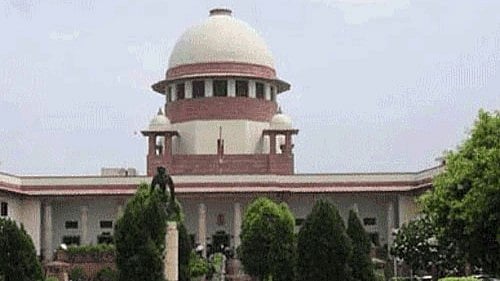
The Supreme Court of India
PTI file photo
New Delhi: The Supreme Court has said provisions of Section 437(6) of the Criminal Procedure Code cannot be considered to be mandatory in nature and cannot be interpreted to grant an absolute and indefeasible right of bail in favour of accused.
However, bail applications filed under Section 437(6) have to be given a liberal approach and it would be a sound and judicious exercise of discretion in favour of the accused by the court concerned, a bench of Justices J B Pardiwala and R Mahadevan said.
Section 437(6) allowed bail, in any case triable by a Magistrate, if the trial of a person accused of any non-bailable offence is not concluded within a period of 60 days from the first date fixed for taking evidence in the case.
In its order on February 18, 2025, the court allowed bail to appellant Subhelal alias Sushil Sahu, arrested in December, 2023 in a cheating case lodged in Raipur, related to defrauding almost 2000 investors in a scheme of crypto currency. The bench directed him to deposit Rs 35 lakh as a bail condition.
"We have been condemning the High Courts when they impose such conditions. But here is a case wherein we are compelled to impose such conditions having regard to the peculiar facts of this case," the bench said.
Questioning the prosecution for naming 189 witnesses in the case, the bench said even if 50 witnesses are examined, it would take a long time for the trial to conclude in the case, which carries a maximum sentence of seven years' jail.
The appellant's counsel relied upon Section 437(6) for bail.
Examining the legal provision, the court said in such cases, some of the factors to be considered included where there is no chance of tampering of evidence e.g. where the case depends on documentary evidence which is already collected; no fault on part of the accused in causing of delay; no chances of any abscondence by the accused; little scope for conclusion of trial in near future and where the period for which accused has been in jail is substantial in comparison to the sentence prescribed for the offence for which he is tried.
"Normal parameters for deciding bail application would also be relevant while deciding application under Section 437(6), but not with that rigour as they might have been at the time of application for regular bail," the bench said.
The court felt an application under Section 437(6) has to be dealt with liberal hands to protect individual liberty as envisaged under the Constitution and sought to be protected by insertion of the provision by the legislature.
"The provision can certainly be said to have been inserted with an intention to speed up the trial without unnecessarily detaining a person as an under-trial prisoner for a prolonged time. Contrary to that, Section 167(2) (statutory bail) leaves no room for any discretion with the court so far as release of an accused on bail is concerned in the given set of circumstances," the bench said.
The court, however, pointed out that a later part of sub-section (6) of Section 437 empowers a Magistrate to refuse bail by assigning reasons.
"In our view, the legislature has incorporated this provision with a view to recognise the right of an accused for a speedy trial with a view to protect individual liberty," the bench said.
At the same time, the bench said, the legislature has tried to strike a balance by allowing the Magistrate to refuse bail by assigning reasons ina given set of circumstances.
"Meaning thereby, that where in the opinion of the Magistrate, it is not proper or desirable or in the interest of justice to release such accused on bail, he may refuse bail by assigning reasons. The provisions of Section 437(6), as such, cannot be considered to be mandatory in nature and cannot be interpreted to grant an absolute and indefeasible right of bail in favour of accused," the bench said.
